Why UWM Matters
It’s become crucial to city, state. But will state leaders recognize this?
Out-going UWS President Ray Cross has recommended a full review of the degree program arrays on all UW system campuses, with the exception of UW-Madison and UW-Milwaukee. These campuses are in dire economic condition, so perhaps by narrowing their range of offerings and using more online instruction, they can be made viable. While Cross spared UWM from this cleavage, the financial shape of the campus is bad, and with anticipated new cuts, catastrophic. Against a $650 million dollar budget, revenue is expected to drop — just this year — another $18 million, and the state funding is slated to fall by $7 million. The campus is in financial peril.
In the June 6th Urban Milwaukee, John Torinus writes about the importance of UWM to the business community, and he encourages that community to step up right now to protect the university from these additional cuts. He is right, but let’s hope for the right reasons. The Milwaukee business community and the broader Southeast Wisconsin community should have a clear idea what has been built at UWM, and what they are losing rapidly.
Today, UWM is recognized as a world-class research university, and recognized by the Carnegie Foundation as one of only 115 universities designated Tier One for Research.The visionaries who established UWM in the 1960s had just such an idea in mind: creating a second top research university but in the major city of the state. They knew that academic excellence would have great economic, cultural, and social impact. A small army of scholars came to Milwaukee to create that second great research university. The Carnegie designation is proof of their success.
UWM is also one of the priceless sources of upward mobility for students of a wide range of backgrounds. Its graduates are architects, artists, business executives, educators, engineers, entertainers, healthcare professionals, religious leaders, and scientists whose work now enhances the quality of life in Southeast Wisconsin.
Since the process of creating new knowledge in a university setting bears so little resemblance to the functioning of business hierarchies, it is understandable that business journalists find it hard to assess their performance. Perhaps, they should rely on aggregate indicators. Here is one: Dane County (home to UW-Madison), accounted for 70% of private sector jobs added in Wisconsin in the few years prior to the current pandemic.
The Walker Administration tried to re-direct the evaluation of campus research away from this peer review process towards a system in which the Governor and Legislature would set the research agenda toward an amorphous concept known as “workforce development.” The danger of going down this path of political review and away from peer review is that the research performed will inevitably move far from the cutting edge. It would become much harder, and possibly impossible, to recruit and retain faculty of the caliber of those professors who transformed UWM into the research powerhouse that it is now.
The Carnegie Foundation designation is a signal that now is the appropriate time to invest — not cut — UWM’s budget so that the level of excellence achieved can be maintained. The budget cuts and the mission re-direction efforts have harmed more than the institution itself; among the other losers are those advanced business and cultural enterprises, whose prosperity relies in part on bringing to Wisconsin talented people that are on the leading edge in their fields of expertise.
Of course, the biggest losers will be those many excellent students for whom UWM is the only major research university within their financial grasp. We hope that the in-coming system president will share Ray Cross’s recognition of the special nature of UWM as a premier urban research university in the heart of the state’s economy.
William Holahan is Emeritus Professor and former Chair of the Department of Economics at the University of Wisconsin-Milwaukee. Charles Kroncke served as Professor of Finance at UW-Madison and Business Dean at Auburn, UW-Milwaukee, and UT-Dallas. They are co-authors of “Economics for Voters.”
Op-Ed
-
Wisconsin Candidates Decry Money in Politics, Plan to Raise Tons of It
 Dec 15th, 2025 by Ruth Conniff
Dec 15th, 2025 by Ruth Conniff
-
Trump Left Contraceptives to Rot; Women Pay the Price
 Dec 8th, 2025 by Dr. Shefaali Sharma
Dec 8th, 2025 by Dr. Shefaali Sharma
-
Why the Common Council’s Amended Budget is Good Policy for Milwaukee
 Nov 20th, 2025 by Alds. Marina Dimitrijevic and Russell W. Stamper, II
Nov 20th, 2025 by Alds. Marina Dimitrijevic and Russell W. Stamper, II





















